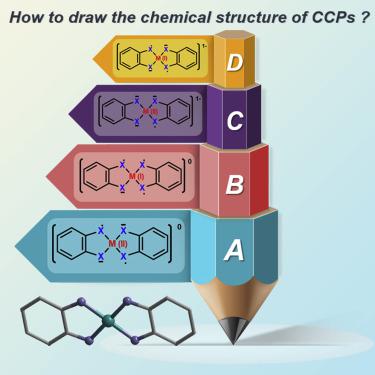Chem ( IF 23.5 ) Pub Date : 2020-12-31 , DOI: 10.1016/j.chempr.2020.12.007 Kun Fan , Chenyang Zhang , Yuan Chen , Yanchao Wu , Chengliang Wang

|
Conjugated coordination polymers (CCPs) with extended π-d conjugation can effectively facilitate the delocalization of charges, form a continuous electron transfer pathway, and enhance the stability, which enable their potential applications in various devices. However, the CCPs are so unique that the accurate chemical states or structures of most CCPs, such as the valence of metal ions, the single/double bond characters of ligands, and the presence/absence of counter ions and radicals, still have disputations in the literature. Herein, we focus on disclosing the fundamental understanding of the chemical states and structures of CCPs based on our previous works and other literatures. The synthetic control for a desired/ideal structure with high crystallinity and the variation of chemical states during the charge storage further deepen the understanding of the chemical states of CCPs. On this basis, the challenges and opportunities for further development of CCPs are also prospected.
中文翻译:

共轭配位聚合物的化学状态
具有扩展的π-d共轭的共轭配位聚合物(CCP)可以有效地促进电荷的离域,形成连续的电子传输路径并增强稳定性,从而使其在各种设备中具有潜在的应用前景。但是,CCP是如此独特,以至于大多数CCP的准确化学状态或结构,例如金属离子的价数,配体的单键/双键特性以及抗衡离子和自由基的存在/不存在,仍然存在争议。文献。在本文中,我们将基于先前的工作和其他文献,重点介绍对CCP的化学状态和结构的基本理解。对具有高结晶度的所需/理想结构以及电荷存储过程中化学状态变化的综合控制,进一步加深了对CCP的化学状态的了解。在此基础上,还展望了CCP进一步发展所面临的挑战和机遇。


























 京公网安备 11010802027423号
京公网安备 11010802027423号